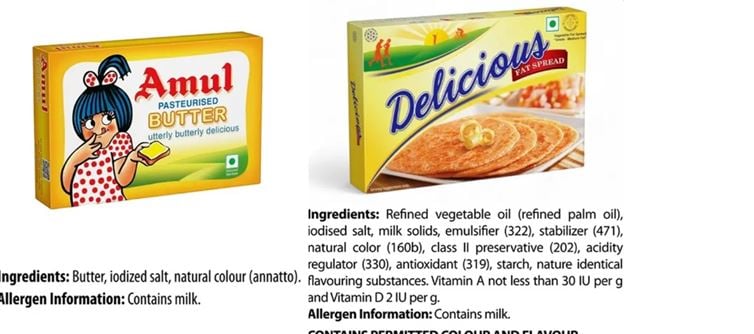
India’s Dairy Aisle Has a Silent Scam—And Millions Don’t Even Realise They’re Falling For It
Walk into any supermarket in india and you’ll find two nearly identical yellow boxes sitting side by side: Amul Butter and Delicious Fat Spread. Same shape. Similar colour. Same familiar Amul-style design language. One costs ₹58. The other is just ₹19. One is real butter. The other is palm-oil-based fat spread.
Thousands of customers unintentionally pick up the cheaper one, thinking it’s butter.
And then the company shrugs and says:
“Consumers should read the label.”
That line isn’t just tone-deaf.
It’s insulting.
Because when two products look nearly the same and sit next to each other, confusion isn’t “lack of awareness.”
It’s a predictable outcome.
Some might even say: an engineered one.
🟥 THE DECEPTIVE TWIN PROBLEM: SAME LOOK, DIFFERENT PRODUCT
The Packaging Looks Like a Mirror Copy
Put Amul butter and Delicious Fat Spread next to each other.
Unless you stare carefully at the text, you’ll barely notice the difference.
Same rectangular 100g box
Same yellow shades
Same red & blue typography cues
Same visual identity
Same freezer shelf spot
To the average shopper glancing quickly—or picking up something while juggling kids, bags, bills, or a phone—it’s indistinguishable.
And confusion isn’t accidental.
This visual similarity benefits someone.
🟧 THE PRICE GAP: A KEY INGREDIENT IN THE CONFUSION
₹58 for butter.
₹19 for fat spread.
A massive price gap—but the boxes look like siblings.
Most customers assume:
“Maybe this is the same butter… just on discount.”
or
“Maybe this is just another variant of Amul butter.”
People are not chemists.
People are not regulatory inspectors.
People are busy.
And brands know this.
🟦 THE TRUTH INSIDE THE BOX: butter VS PALM OIL
Butter
Made from milk fat.
Natural dairy product.
The product you intend to buy.
Delicious Fat Spread
Primarily palm oil + emulsifiers.
Not butter.
Not dairy.
Just a low-cost substitute dressed in familiar clothes.
Palm oil is not inherently evil—but it should not be mistaken for butter.
🟨 ‘READ THE LABEL’ IS NOT A DEFENCE. IT’S A DEFLECTION.
Brands often say: “Consumers should read the label. Everything is written.”
That’s like giving someone a test in size-6 font while designing the cover to make them fail.
Design is communication.
If the design misleads the customer while the label tries to clarify the truth in tiny text, the result is confusion—and the blame should not be placed on the buyer.
Stop calling consumers “unaware.”
They’re not unaware.
They’re being visually misled.
🟩 THE SUPERMARKET STRATEGY: CONFUSE FIRST, CASH LATER
Placing both products next to each other—same shelf, same orientation—only increases the probability of mistaken purchases.
Why would any brand place:
a premium product
and its ultra-cheap lookalike
next to each other in identical formats?
Simple:
People will accidentally pick the cheaper one, thinking it’s the real thing. Sales go up. Confusion goes up. Responsibility goes down.
This isn’t consumer “ignorance.”
This is retail psychology used against the shopper.
🟫 FSSAI MUST STEP IN: CONSUMER PROTECTION IS NOT OPTIONAL
Food regulators across the world enforce strict visual distinction between:
butter & margarine
meat & plant substitute
dairy & dairy-like product
Why?
To prevent exactly this type of market confusion.
FSSAI can and should mandate:
Clear visual distinction
Prominent front-label warnings: “NOT BUTTER”
Different packaging colours
Separate shelf placement
Bolder font standards for the product category
If packaging misleads consumers,
Regulation must intervene.
That’s what regulators are for.
🟪 FINAL WORD: THIS ISN’T ABOUT DAIRY. IT’S ABOUT TRUST.
When brands intentionally design lookalike products, they chip away at consumer trust—slowly, silently, consistently.
If butter is expensive, let it be expensive.
If fat spread is cheap, let it be cheap.
But don’t mix the two in identical suits and then blame the customer for not reading a microscopic label.
Customers deserve clarity—not cleverly engineered confusion.
And if clarity doesn’t come voluntarily,
FSSAI must enforce it.




 click and follow Indiaherald WhatsApp channel
click and follow Indiaherald WhatsApp channel